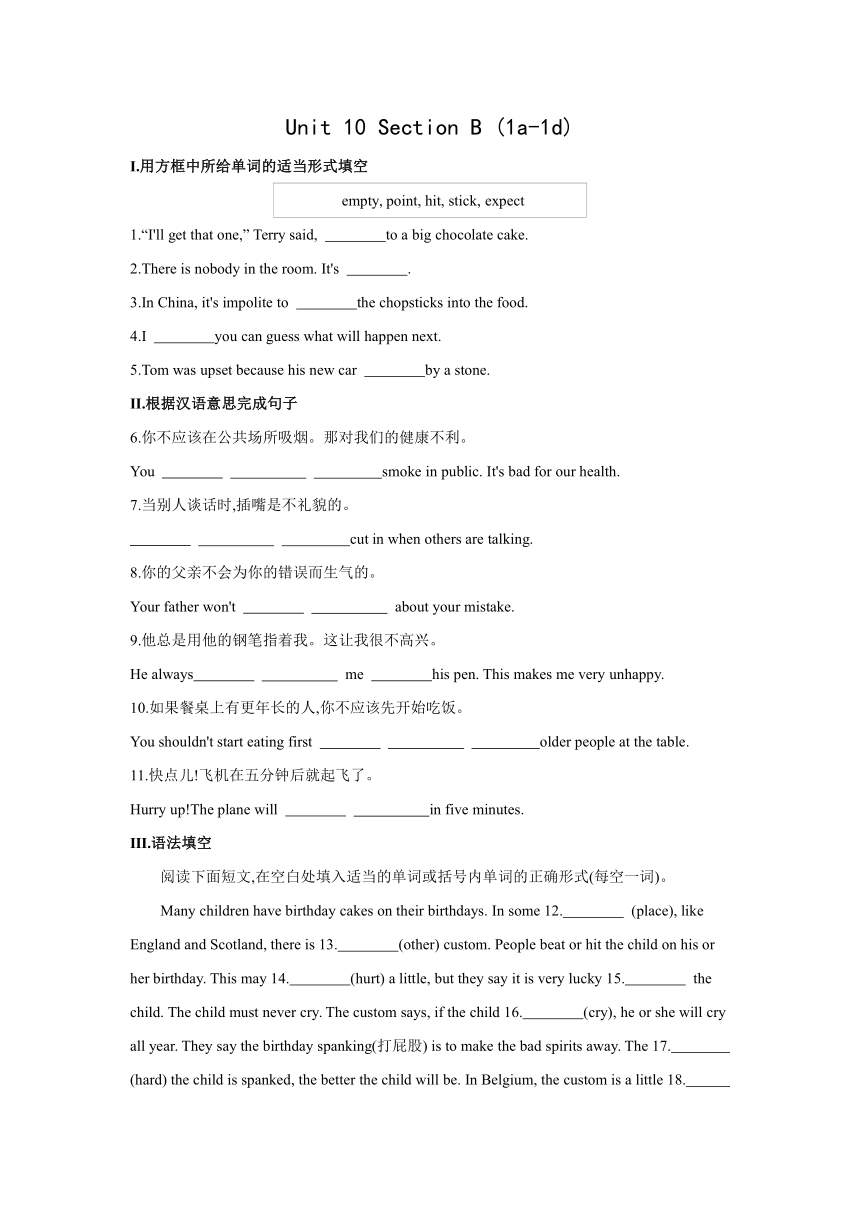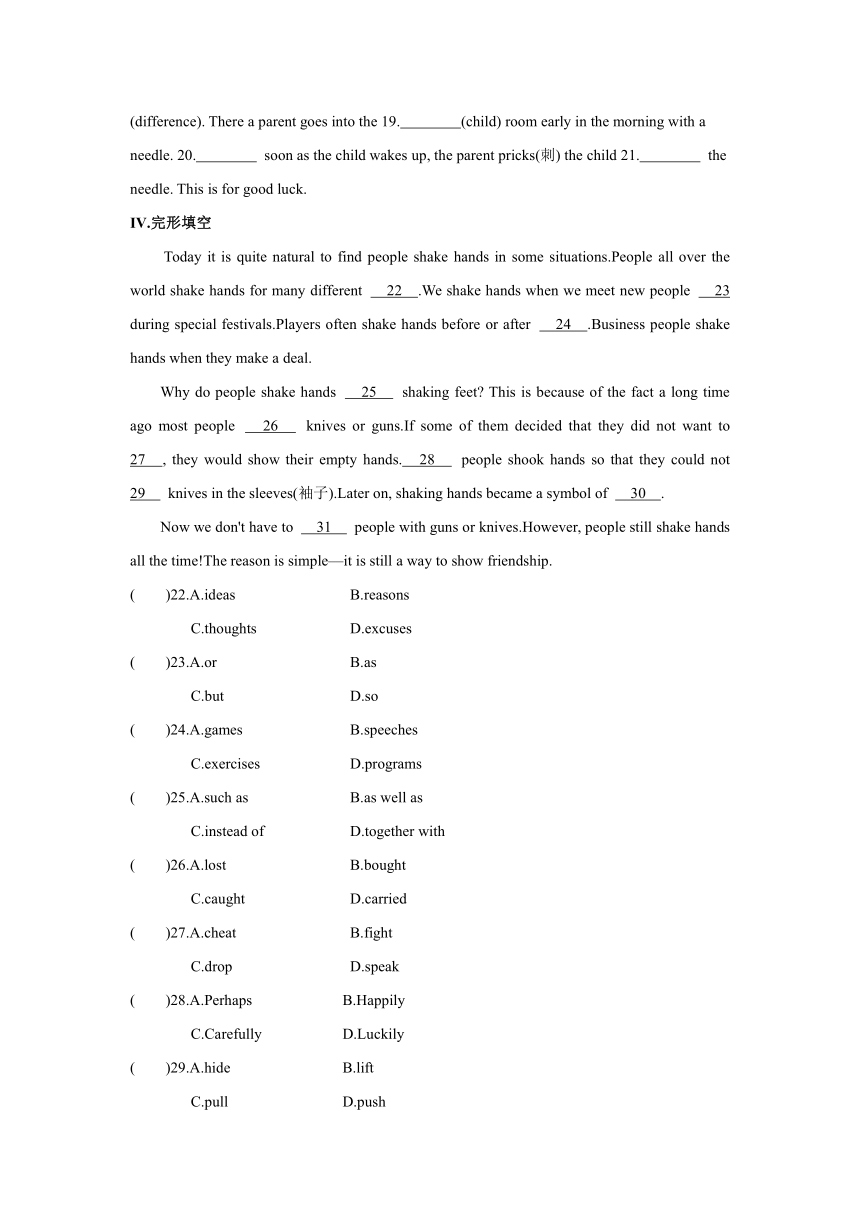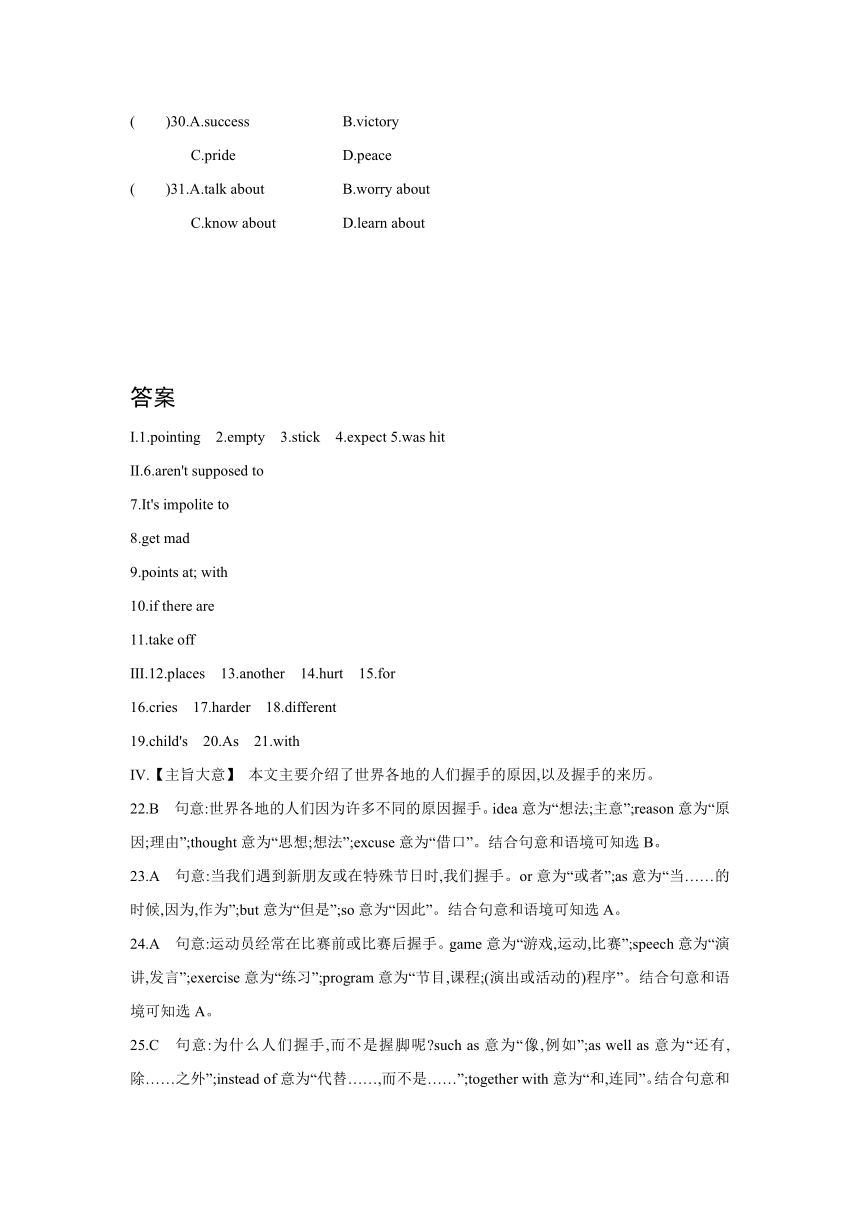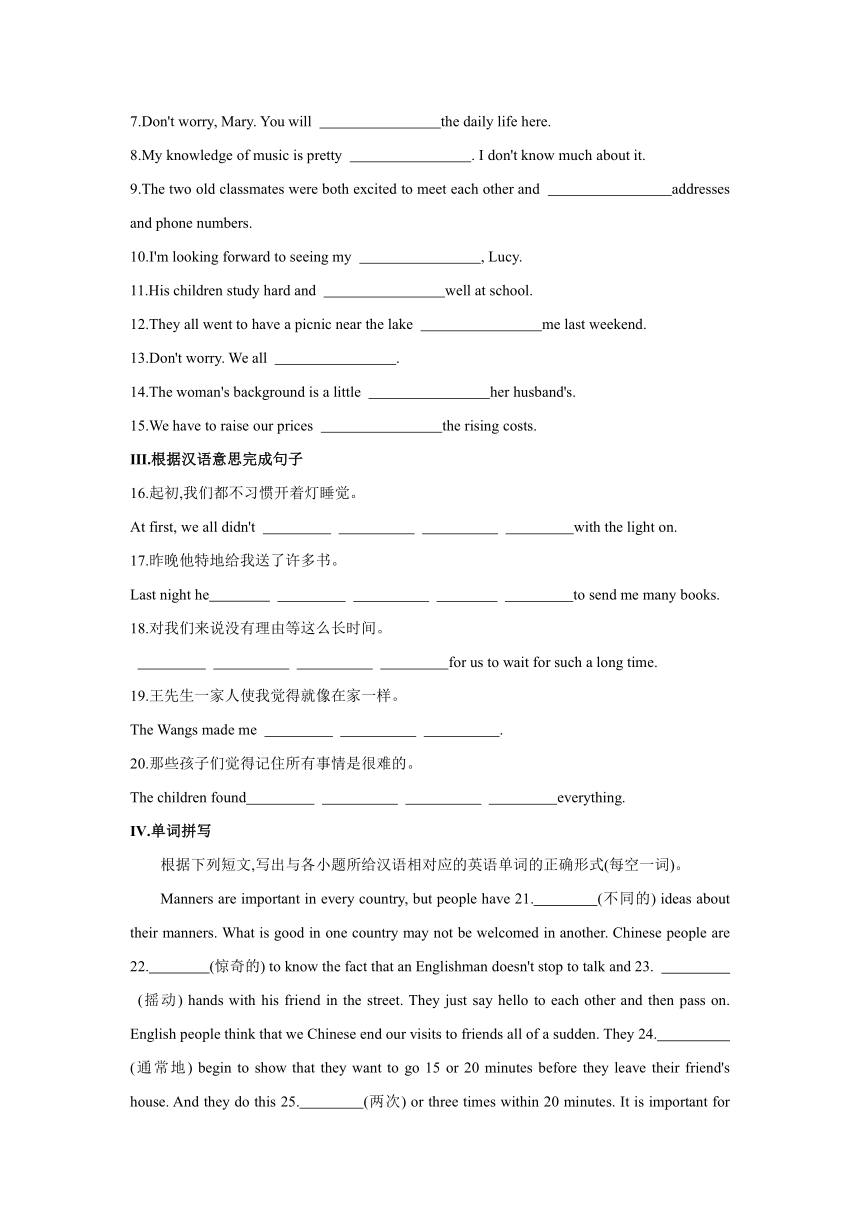Unit 10 You are supposed to shake hands. Section B 同步练习(2课时 含答案)
文档属性
| 名称 | Unit 10 You are supposed to shake hands. Section B 同步练习(2课时 含答案) |  | |
| 格式 | zip | ||
| 文件大小 | 53.0KB | ||
| 资源类型 | 教案 | ||
| 版本资源 | 人教新目标(Go for it)版 | ||
| 科目 | 英语 | ||
| 更新时间 | 2021-07-30 22:40:31 | ||
图片预览





文档简介
Unit
10
Section
B
(1a-1d)
Ⅰ.用方框中所给单词的适当形式填空
empty,
point,
hit,
stick,
expect
1.“I'll
get
that
one,”
Terry
said,
to
a
big
chocolate
cake.?
2.There
is
nobody
in
the
room.
It's
.?
3.In
China,
it's
impolite
to
the
chopsticks
into
the
food.?
4.I
you
can
guess
what
will
happen
next.?
5.Tom
was
upset
because
his
new
car
by
a
stone.?
Ⅱ.根据汉语意思完成句子
6.你不应该在公共场所吸烟。那对我们的健康不利。
You
smoke
in
public.
It's
bad
for
our
health.
?
7.当别人谈话时,插嘴是不礼貌的。
cut
in
when
others
are
talking.
?
8.你的父亲不会为你的错误而生气的。
Your
father
won't
about
your
mistake.
?
9.他总是用他的钢笔指着我。这让我很不高兴。
He
always
me
his
pen.
This
makes
me
very
unhappy.?
10.如果餐桌上有更年长的人,你不应该先开始吃饭。
You
shouldn't
start
eating
first
older
people
at
the
table.
?
11.快点儿!飞机在五分钟后就起飞了。
Hurry
up!The
plane
will
in
five
minutes.?
Ⅲ.语法填空
阅读下面短文,在空白处填入适当的单词或括号内单词的正确形式(每空一词)。
Many
children
have
birthday
cakes
on
their
birthdays.
In
some
12.
(place),
like
England
and
Scotland,
there
is
13. (other)
custom.
People
beat
or
hit
the
child
on
his
or
her
birthday.
This
may
14. (hurt)
a
little,
but
they
say
it
is
very
lucky
15.
the
child.
The
child
must
never
cry.
The
custom
says,
if
the
child
16. (cry),
he
or
she
will
cry
all
year.
They
say
the
birthday
spanking(打屁股)
is
to
make
the
bad
spirits
away.
The
17.
(hard)
the
child
is
spanked,
the
better
the
child
will
be.
In
Belgium,
the
custom
is
a
little
18. (difference).
There
a
parent
goes
into
the
19. (child)
room
early
in
the
morning
with
a
needle.
20.
soon
as
the
child
wakes
up,
the
parent
pricks(刺)
the
child
21.
the
needle.
This
is
for
good
luck.?
Ⅳ.完形填空
Today
it
is
quite
natural
to
find
people
shake
hands
in
some
situations.People
all
over
the
world
shake
hands
for
many
different
22 .We
shake
hands
when
we
meet
new
people
23
during
special
festivals.Players
often
shake
hands
before
or
after
24 .Business
people
shake
hands
when
they
make
a
deal.?
Why
do
people
shake
hands
25
shaking
feet?
This
is
because
of
the
fact
a
long
time
ago
most
people
26
knives
or
guns.If
some
of
them
decided
that
they
did
not
want
to
27 ,
they
would
show
their
empty
hands. 28
people
shook
hands
so
that
they
could
not
29
knives
in
the
sleeves(袖子).Later
on,
shaking
hands
became
a
symbol
of
30 .?
Now
we
don't
have
to
31
people
with
guns
or
knives.However,
people
still
shake
hands
all
the
time!The
reason
is
simple—it
is
still
a
way
to
show
friendship.?
( )22.A.ideas
B.reasons
C.thoughts
D.excuses
( )23.A.or
B.as
C.but
D.so
( )24.A.games
B.speeches
C.exercises
D.programs
( )25.A.such
as
B.as
well
as
C.instead
of
D.together
with
( )26.A.lost
B.bought
C.caught
D.carried
( )27.A.cheat
B.fight
C.drop
D.speak
( )28.A.Perhaps
B.Happily
C.Carefully
D.Luckily
( )29.A.hide
B.lift
C.pull
D.push
( )30.A.success
B.victory
C.pride
D.peace
( )31.A.talk
about
B.worry
about
C.know
about
D.learn
about
答案
Ⅰ.1.pointing 2.empty 3.stick 4.expect
5.was
hit
Ⅱ.6.aren't
supposed
to
7.It's
impolite
to
8.get
mad
9.points
at;
with
10.if
there
are
11.take
off
Ⅲ.12.places 13.another 14.hurt 15.for
16.cries 17.harder 18.different
19.child's 20.As 21.with
Ⅳ.【主旨大意】
本文主要介绍了世界各地的人们握手的原因,以及握手的来历。
22.B 句意:世界各地的人们因为许多不同的原因握手。idea意为“想法;主意”;reason意为“原因;理由”;thought意为“思想;想法”;excuse意为“借口”。结合句意和语境可知选B。
23.A 句意:当我们遇到新朋友或在特殊节日时,我们握手。or意为“或者”;as意为“当……的时候,因为,作为”;but意为“但是”;so意为“因此”。结合句意和语境可知选A。
24.A 句意:运动员经常在比赛前或比赛后握手。game意为“游戏,运动,比赛”;speech意为“演讲,发言”;exercise意为“练习”;program意为“节目,课程;(演出或活动的)程序”。结合句意和语境可知选A。
25.C 句意:为什么人们握手,而不是握脚呢?such
as意为“像,例如”;as
well
as意为“还有,除……之外”;instead
of意为“代替……,而不是……”;together
with意为“和,连同”。结合句意和语境可知选C。
26.D 句意:这是因为很久以前,大多数人都带着刀或枪。lose意为“丢失”;buy意为“买”;catch意为“赶上,抓住,接住”;carry意为“携带,搬”。结合句意和语境可知选D。
27.B 句意:如果他们中的一些人决定不想打架,他们就会把他们的空手展示给对方看。cheat意为“欺骗”;fight意为“战斗,打架”;drop意为“落下”;speak意为“说话,讲某种语言”。结合句意和语境可知选B。
28.A 句意:也许人们握手,这样他们就不会把刀藏在袖子里。perhaps意为“也许,可能”;happily意为“快乐地,幸福地”;carefully意为“仔细地;小心谨慎地”;luckily意为“幸运地”。结合句意和语境可知选A。
29.A 句意:也许人们握手,这样他们就不会把刀藏在袖子里。hide意为“隐藏”;lift意为“举起,提升”;pull意为“拉”;push意为“推”。结合句意和语境可知选A。
30.D 句意:后来,握手就成了和平的象征。success意为“成功,成就”;victory意为“胜利”;pride意为“自豪”;peace意为“和平”。结合句意和语境可知选D。
31.B 句意:现在我们不必担心人们带着枪或刀了。talk
about意为“谈论”;worry
about意为“担心”;know
about意为“了解,知道”;learn
about意为“了解;学到”。结合句意和语境可知选B。
Unit
10
Section
B
(2a-2e)
Ⅰ.
用所给单词的适当形式填空
1.The
children
had
a
great
time
(play)
in
the
water
yesterday
evening.
?
2.It's
rude
to
eat
while
(walk)
down
the
street.?
3.The
family
is
the
(base)
unit
of
society.
?
4.Their
(behave)
towards
me
shows
that
they
do
not
like
me.?
5.They
forget
someone
that
lives
in
their
deep
hearts
(gradual).?
Ⅱ.用方框中所给单词或短语的适当形式填空
different
from,
cut
up,
get
use
to,
because
of,
make
mistakes,
exchange,
basic,
granddaughter,
behave,
except
6.The
cook
is
some
chicken
and
he
is
going
to
make
chicken
soup.?
7.Don't
worry,
Mary.
You
will
the
daily
life
here.
?
8.My
knowledge
of
music
is
pretty
.
I
don't
know
much
about
it.?
9.The
two
old
classmates
were
both
excited
to
meet
each
other
and
addresses
and
phone
numbers.?
10.I'm
looking
forward
to
seeing
my
,
Lucy.?
11.His
children
study
hard
and
well
at
school.?
12.They
all
went
to
have
a
picnic
near
the
lake
me
last
weekend.?
13.Don't
worry.
We
all
.
?
14.The
woman's
background
is
a
little
her
husband's.
?
15.We
have
to
raise
our
prices
the
rising
costs.?
Ⅲ.根据汉语意思完成句子
16.起初,我们都不习惯开着灯睡觉。
At
first,
we
all
didn't
with
the
light
on.?
17.昨晚他特地给我送了许多书。
Last
night
he
to
send
me
many
books.?
18.对我们来说没有理由等这么长时间。
for
us
to
wait
for
such
a
long
time.?
19.王先生一家人使我觉得就像在家一样。
The
Wangs
made
me
.?
20.那些孩子们觉得记住所有事情是很难的。
The
children
found
everything.?
Ⅳ.单词拼写
根据下列短文,写出与各小题所给汉语相对应的英语单词的正确形式(每空一词)。
Manners
are
important
in
every
country,
but
people
have
21. (不同的)
ideas
about
their
manners.
What
is
good
in
one
country
may
not
be
welcomed
in
another.
Chinese
people
are
22. (惊奇的)
to
know
the
fact
that
an
Englishman
doesn't
stop
to
talk
and
23.
(摇动)
hands
with
his
friend
in
the
street.
They
just
say
hello
to
each
other
and
then
pass
on.
English
people
think
that
we
Chinese
end
our
visits
to
friends
all
of
a
sudden.
They
24.
(通常地)
begin
to
show
that
they
want
to
go
15
or
20
minutes
before
they
leave
their
friend's
house.
And
they
do
this
25. (两次)
or
three
times
within
20
minutes.
It
is
important
for
people
to
understand
each
other.
Here
is
a
saying,
“When
in
Rome,
do
as
the
Romans
do.”?
Ⅴ.语法填空
阅读下面短文,在空白处填入适当的单词或括号内单词的正确形式(每空一词)。
I
worked
in
France
two
years
ago.
It
was
great
to
work
in
a
foreign
country.
I
also
learned
some
French
26. (custom).
I
want
to
share
some
of
them
27.
you.
?
First,
you
should
start
a
conversation
with
a
Frenchman
in
28. (France).
The
French
take
pride
29.
their
language—French.
The
best
way
to
show
respect
for
that
is
to
do
your
best
to
speak
French—even
there
are
a
few
badly
pronounced
words.
?
30. (two),
take
your
lunch
and
coffee
breaks
even
if
you're
busy
working
on
something
important.
The
lunch
break
can
be
31.
good
chance
to
make
friends.
?
Third,
start
your
day
in
a
French
office
by
32. (shake)
hands
with
your
colleagues
and
saying
“Bonjour”.
However,
don't
shake
hands
when
you
should
exchange
la
bise,
the
kiss
on
the
cheek.
You
should
exchange
la
bise
with
friends
and
family
33. (member).
?
At
last,
lunch
breaks
34. (be)
very
important
to
Frenchmen.
You
can't
ask
your
colleagues
to
work
during
the
lunch
break
because
nothing
can
stop
them
from
35. (have)
their
lunch
breaks.?
Ⅵ.完形填空
I
had
the
idea
to
be
an
exchange
student
in
Germany
in
September,
2019.With
tears
in
my
eyes,
I
said
36
to
my
family.After
I
finally
arrived
at
the
airport
in
Berlin,
I
was
welcomed
by
my
host(主人)
family.They
didn't
know
much
about
my
37 .“I
hobble(跛行)
a
little,
but
I
don't
see
it
as
a
problem.”
I
think
it's
the
will
that
decides
38
you
can
and
cannot
do,
and
the
disability
doesn't
matter!?
Before
I
went
there,
I
knew
I
was
going
to 39
home.But
I
went!
Why?
I've
been
a
fighter
ever
since
I
decided
not
to
40
my
breath
when
I
was
born!
My
mother
wrote
to
my
host
mom
about
my
trouble.My
host
supported
me
greatly. 41
e-mail,
they
also
told
all
my
teachers
about
me.?
Everything
worked 42 .By
the
end
of
my
year,
we
were
asked
to
talk
about
our
years.I
spoke
in
front
of
about
100
people!
I
was
43
my
great
speech.The
next
day,
some
teachers
stopped
me
and
said,
“Your
speech
was
the
best
one.”?
My
year
in
Berlin
was
the 44
thing
I've
done
so
far!
I
have
proved
I
am
a
45
and
that
nothing
is
impossible!?
( )36.A.no
B.goodbye
C.sorry
D.okay
( )37.A.study
B.family
C.disability
D.name
( )38.A.what
B.that
C.when
D.where
( )39.A.leave
B.forget
C.lose
D.miss
( )40.A.take
up
B.give
out
C.give
up
D.take
out
( )41.A.With
B.By
C.Through
D.Without
( )42.A.fast
B.slow
C.hard
D.well
( )43.A.surprised
at
B.worried
about
C.afraid
of
D.proud
of
( )44.A.last
B.best
C.worst
D.first
( )45.A.fighter
B.student
C.writer
D.speaker
Ⅶ.任务型阅读
阅读下面短文,根据短文内容,在每小题句子空白处填入适当词语,使其意思与短文内容一致(每空词数不限)。
On
December
24,
kids
around
the
world
waited
for
Santa
Claus.
They
thought
that
the
fat,
white-bearded
man
would
bring
them
gifts.
But
do
you
know
that
some
people
would
rather
keep
Santa
out
of
the
door?
Last
month,
10
doctoral(博士的)
students
from
Tsinghua,
Peking
and
Renmin
Universities
said
Santa
Claus
wasn't
welcome
in
China.
“Foreign
holidays
like
Christmas
are
now
very
popular
in
China,
while
fewer
and
fewer
people
celebrate
traditional
Chinese
festivals
like
the
Dragon
Boat
Festival,”
said
the
students
in
a
public
letter.
They
asked
people
to
stop
sending
Christmas
cards
and
giving
gifts
to
their
children.
Instead,
they
said
Chinese
should
spend
more
time
on
traditional
festivals.
They
got
lots
of
support.
In
Hunan,
several
people
went
out
on
the
street
on
Christmas
Day.
They
made
poems
and
wrote
Chinese
calligraphy(书法).
“Rather
than
spending
money
on
Christmas,
we
should
care
more
about
our
own
culture,”
said
one
of
them.
But
others
have
different
ideas.
“Celebrations
of
foreign
holidays
help
us
know
more
about
foreign
cultures.
It
is
good
for
us
to
make
friends,”
said
Liu
Yang,
a
14-year-old
boy
from
Shanghai.
Sun
Long,
13,
from
Beijing,
sees
the
celebration
as
a
way
to
make
people
happier
and
closer.
“My
school
held
a
big
party
on
Christmas
Day.
We
played
games
and
shared
gifts
with
each
other.
I
think
we
have
got
closer,”
he
said.
46.On
December
24,
kids
waited
for
Santa
Claus.?
47.Last
month,
10
doctoral
students
from
Tsinghua,
Peking
and
Renmin
Universities
said
Santa
Claus
wasn't
in
China.?
48.The
students
asked
people
to
stop
sending
Christmas
cards
and
giving
to
their
children.?
49.Several
people
in
Hunan
thought
we
should
our
own
culture
rather
than
spending
money
on
Christmas
Day.?
50.Liu
Yang,
a
14-year-old
boy
from
Shanghai,
said
of
foreign
holidays
help
us
know
more
about
foreign
cultures.?
答案
Ⅰ.1.playing 2.walking 3.basic
4.behavior 5.gradually
Ⅱ.6.cutting
up 7.get
used
to 8.basic
9.exchanged 10.granddaughter
11.behave 12.except 13.make
mistakes
14.different
from 15.because
of
Ⅲ.16.get
used
to
sleeping
17.went
out
of
his
way
18.There
is
no
reason 19.
feel
at
home
20.it
difficult/hard
to
remember
Ⅳ.21.different 22.surprised 23.shake
24.usually 25.twice
Ⅴ.26.customs 27.with 28.French
29.in 30.Second 31.a 32.shaking
33.members 34.are 35.having
Ⅵ.【主旨大意】
本文是一篇记叙文。2019年9月,作者萌生去德国做交换生的想法。文章通过作者作为一名交换生的经历谈论对人生的感悟:
只要努力,一切皆有可能。
36.B 由下文“After
I
finally
arrived
at
the
airport
in
Berlin(在我终于到达柏林机场之后)”的提示可知,“我”告别了家人。故选B。
37.C 由下文“I
hobble
a
little,
but
I
don't
see
it
as
a
problem.(我有点跛,但我不把它当一个问题。)”的提示可知,设空处是讲“残疾”。故选C。
38.A 句意:我认为是意志决定了你能做什么和不能做什么,而残疾并不重要!what作do的宾语。故选A。
39.D 句意:在我去那里之前,我知道我会想家的。由下文“But
I
went(但我还是去了)”可知,此处miss(想念)符合句意。故选D。
40.C 句意:自从我出生时决定不放弃呼吸,我就一直是个斗士!take
up意为“开始从事,占用”;give
out意为“发出,分发”;give
up意为“放弃”;take
out意为“拿出”。从“斗士”可以看出,“我”不放弃呼吸。故选C。
41.B 句意:通过电子邮件,他们还把我的情况告诉了我所有的老师。by表示“通过……的方式”。故选B。
42.D 句意:一切进展顺利。由下文“my
great
speech”及“Your
speech
was
the
best
one.”可知,“我”在德国一切顺利。故选D。
43.D 句意:我为我优秀的演讲感到自豪。由“great”可知,“我”为“我”的演讲感到自豪。be
proud
of意为“为……感到自豪”。故选D。
44.B 句意:我在柏林度过的一年是我到目前为止做过的最好的一件事!由上文老师的评价及下文“我”证实了一切皆有可能可知,在德国的一年是“我”做过的最好的事。故选B。
45.A 句意:我已经证明了我是一个斗士,没有什么是不可能的!由第二段中“I've
been
a
fighter”及上下文语境可知,fighter(斗士)符合句意。故选A。
Ⅶ.46.around
the
world/all
over
the
world
47.welcome
48.gifts
49.care
more
about
50.celebrations
10
Section
B
(1a-1d)
Ⅰ.用方框中所给单词的适当形式填空
empty,
point,
hit,
stick,
expect
1.“I'll
get
that
one,”
Terry
said,
to
a
big
chocolate
cake.?
2.There
is
nobody
in
the
room.
It's
.?
3.In
China,
it's
impolite
to
the
chopsticks
into
the
food.?
4.I
you
can
guess
what
will
happen
next.?
5.Tom
was
upset
because
his
new
car
by
a
stone.?
Ⅱ.根据汉语意思完成句子
6.你不应该在公共场所吸烟。那对我们的健康不利。
You
smoke
in
public.
It's
bad
for
our
health.
?
7.当别人谈话时,插嘴是不礼貌的。
cut
in
when
others
are
talking.
?
8.你的父亲不会为你的错误而生气的。
Your
father
won't
about
your
mistake.
?
9.他总是用他的钢笔指着我。这让我很不高兴。
He
always
me
his
pen.
This
makes
me
very
unhappy.?
10.如果餐桌上有更年长的人,你不应该先开始吃饭。
You
shouldn't
start
eating
first
older
people
at
the
table.
?
11.快点儿!飞机在五分钟后就起飞了。
Hurry
up!The
plane
will
in
five
minutes.?
Ⅲ.语法填空
阅读下面短文,在空白处填入适当的单词或括号内单词的正确形式(每空一词)。
Many
children
have
birthday
cakes
on
their
birthdays.
In
some
12.
(place),
like
England
and
Scotland,
there
is
13. (other)
custom.
People
beat
or
hit
the
child
on
his
or
her
birthday.
This
may
14. (hurt)
a
little,
but
they
say
it
is
very
lucky
15.
the
child.
The
child
must
never
cry.
The
custom
says,
if
the
child
16. (cry),
he
or
she
will
cry
all
year.
They
say
the
birthday
spanking(打屁股)
is
to
make
the
bad
spirits
away.
The
17.
(hard)
the
child
is
spanked,
the
better
the
child
will
be.
In
Belgium,
the
custom
is
a
little
18. (difference).
There
a
parent
goes
into
the
19. (child)
room
early
in
the
morning
with
a
needle.
20.
soon
as
the
child
wakes
up,
the
parent
pricks(刺)
the
child
21.
the
needle.
This
is
for
good
luck.?
Ⅳ.完形填空
Today
it
is
quite
natural
to
find
people
shake
hands
in
some
situations.People
all
over
the
world
shake
hands
for
many
different
22 .We
shake
hands
when
we
meet
new
people
23
during
special
festivals.Players
often
shake
hands
before
or
after
24 .Business
people
shake
hands
when
they
make
a
deal.?
Why
do
people
shake
hands
25
shaking
feet?
This
is
because
of
the
fact
a
long
time
ago
most
people
26
knives
or
guns.If
some
of
them
decided
that
they
did
not
want
to
27 ,
they
would
show
their
empty
hands. 28
people
shook
hands
so
that
they
could
not
29
knives
in
the
sleeves(袖子).Later
on,
shaking
hands
became
a
symbol
of
30 .?
Now
we
don't
have
to
31
people
with
guns
or
knives.However,
people
still
shake
hands
all
the
time!The
reason
is
simple—it
is
still
a
way
to
show
friendship.?
( )22.A.ideas
B.reasons
C.thoughts
D.excuses
( )23.A.or
B.as
C.but
D.so
( )24.A.games
B.speeches
C.exercises
D.programs
( )25.A.such
as
B.as
well
as
C.instead
of
D.together
with
( )26.A.lost
B.bought
C.caught
D.carried
( )27.A.cheat
B.fight
C.drop
D.speak
( )28.A.Perhaps
B.Happily
C.Carefully
D.Luckily
( )29.A.hide
B.lift
C.pull
D.push
( )30.A.success
B.victory
C.pride
D.peace
( )31.A.talk
about
B.worry
about
C.know
about
D.learn
about
答案
Ⅰ.1.pointing 2.empty 3.stick 4.expect
5.was
hit
Ⅱ.6.aren't
supposed
to
7.It's
impolite
to
8.get
mad
9.points
at;
with
10.if
there
are
11.take
off
Ⅲ.12.places 13.another 14.hurt 15.for
16.cries 17.harder 18.different
19.child's 20.As 21.with
Ⅳ.【主旨大意】
本文主要介绍了世界各地的人们握手的原因,以及握手的来历。
22.B 句意:世界各地的人们因为许多不同的原因握手。idea意为“想法;主意”;reason意为“原因;理由”;thought意为“思想;想法”;excuse意为“借口”。结合句意和语境可知选B。
23.A 句意:当我们遇到新朋友或在特殊节日时,我们握手。or意为“或者”;as意为“当……的时候,因为,作为”;but意为“但是”;so意为“因此”。结合句意和语境可知选A。
24.A 句意:运动员经常在比赛前或比赛后握手。game意为“游戏,运动,比赛”;speech意为“演讲,发言”;exercise意为“练习”;program意为“节目,课程;(演出或活动的)程序”。结合句意和语境可知选A。
25.C 句意:为什么人们握手,而不是握脚呢?such
as意为“像,例如”;as
well
as意为“还有,除……之外”;instead
of意为“代替……,而不是……”;together
with意为“和,连同”。结合句意和语境可知选C。
26.D 句意:这是因为很久以前,大多数人都带着刀或枪。lose意为“丢失”;buy意为“买”;catch意为“赶上,抓住,接住”;carry意为“携带,搬”。结合句意和语境可知选D。
27.B 句意:如果他们中的一些人决定不想打架,他们就会把他们的空手展示给对方看。cheat意为“欺骗”;fight意为“战斗,打架”;drop意为“落下”;speak意为“说话,讲某种语言”。结合句意和语境可知选B。
28.A 句意:也许人们握手,这样他们就不会把刀藏在袖子里。perhaps意为“也许,可能”;happily意为“快乐地,幸福地”;carefully意为“仔细地;小心谨慎地”;luckily意为“幸运地”。结合句意和语境可知选A。
29.A 句意:也许人们握手,这样他们就不会把刀藏在袖子里。hide意为“隐藏”;lift意为“举起,提升”;pull意为“拉”;push意为“推”。结合句意和语境可知选A。
30.D 句意:后来,握手就成了和平的象征。success意为“成功,成就”;victory意为“胜利”;pride意为“自豪”;peace意为“和平”。结合句意和语境可知选D。
31.B 句意:现在我们不必担心人们带着枪或刀了。talk
about意为“谈论”;worry
about意为“担心”;know
about意为“了解,知道”;learn
about意为“了解;学到”。结合句意和语境可知选B。
Unit
10
Section
B
(2a-2e)
Ⅰ.
用所给单词的适当形式填空
1.The
children
had
a
great
time
(play)
in
the
water
yesterday
evening.
?
2.It's
rude
to
eat
while
(walk)
down
the
street.?
3.The
family
is
the
(base)
unit
of
society.
?
4.Their
(behave)
towards
me
shows
that
they
do
not
like
me.?
5.They
forget
someone
that
lives
in
their
deep
hearts
(gradual).?
Ⅱ.用方框中所给单词或短语的适当形式填空
different
from,
cut
up,
get
use
to,
because
of,
make
mistakes,
exchange,
basic,
granddaughter,
behave,
except
6.The
cook
is
some
chicken
and
he
is
going
to
make
chicken
soup.?
7.Don't
worry,
Mary.
You
will
the
daily
life
here.
?
8.My
knowledge
of
music
is
pretty
.
I
don't
know
much
about
it.?
9.The
two
old
classmates
were
both
excited
to
meet
each
other
and
addresses
and
phone
numbers.?
10.I'm
looking
forward
to
seeing
my
,
Lucy.?
11.His
children
study
hard
and
well
at
school.?
12.They
all
went
to
have
a
picnic
near
the
lake
me
last
weekend.?
13.Don't
worry.
We
all
.
?
14.The
woman's
background
is
a
little
her
husband's.
?
15.We
have
to
raise
our
prices
the
rising
costs.?
Ⅲ.根据汉语意思完成句子
16.起初,我们都不习惯开着灯睡觉。
At
first,
we
all
didn't
with
the
light
on.?
17.昨晚他特地给我送了许多书。
Last
night
he
to
send
me
many
books.?
18.对我们来说没有理由等这么长时间。
for
us
to
wait
for
such
a
long
time.?
19.王先生一家人使我觉得就像在家一样。
The
Wangs
made
me
.?
20.那些孩子们觉得记住所有事情是很难的。
The
children
found
everything.?
Ⅳ.单词拼写
根据下列短文,写出与各小题所给汉语相对应的英语单词的正确形式(每空一词)。
Manners
are
important
in
every
country,
but
people
have
21. (不同的)
ideas
about
their
manners.
What
is
good
in
one
country
may
not
be
welcomed
in
another.
Chinese
people
are
22. (惊奇的)
to
know
the
fact
that
an
Englishman
doesn't
stop
to
talk
and
23.
(摇动)
hands
with
his
friend
in
the
street.
They
just
say
hello
to
each
other
and
then
pass
on.
English
people
think
that
we
Chinese
end
our
visits
to
friends
all
of
a
sudden.
They
24.
(通常地)
begin
to
show
that
they
want
to
go
15
or
20
minutes
before
they
leave
their
friend's
house.
And
they
do
this
25. (两次)
or
three
times
within
20
minutes.
It
is
important
for
people
to
understand
each
other.
Here
is
a
saying,
“When
in
Rome,
do
as
the
Romans
do.”?
Ⅴ.语法填空
阅读下面短文,在空白处填入适当的单词或括号内单词的正确形式(每空一词)。
I
worked
in
France
two
years
ago.
It
was
great
to
work
in
a
foreign
country.
I
also
learned
some
French
26. (custom).
I
want
to
share
some
of
them
27.
you.
?
First,
you
should
start
a
conversation
with
a
Frenchman
in
28. (France).
The
French
take
pride
29.
their
language—French.
The
best
way
to
show
respect
for
that
is
to
do
your
best
to
speak
French—even
there
are
a
few
badly
pronounced
words.
?
30. (two),
take
your
lunch
and
coffee
breaks
even
if
you're
busy
working
on
something
important.
The
lunch
break
can
be
31.
good
chance
to
make
friends.
?
Third,
start
your
day
in
a
French
office
by
32. (shake)
hands
with
your
colleagues
and
saying
“Bonjour”.
However,
don't
shake
hands
when
you
should
exchange
la
bise,
the
kiss
on
the
cheek.
You
should
exchange
la
bise
with
friends
and
family
33. (member).
?
At
last,
lunch
breaks
34. (be)
very
important
to
Frenchmen.
You
can't
ask
your
colleagues
to
work
during
the
lunch
break
because
nothing
can
stop
them
from
35. (have)
their
lunch
breaks.?
Ⅵ.完形填空
I
had
the
idea
to
be
an
exchange
student
in
Germany
in
September,
2019.With
tears
in
my
eyes,
I
said
36
to
my
family.After
I
finally
arrived
at
the
airport
in
Berlin,
I
was
welcomed
by
my
host(主人)
family.They
didn't
know
much
about
my
37 .“I
hobble(跛行)
a
little,
but
I
don't
see
it
as
a
problem.”
I
think
it's
the
will
that
decides
38
you
can
and
cannot
do,
and
the
disability
doesn't
matter!?
Before
I
went
there,
I
knew
I
was
going
to 39
home.But
I
went!
Why?
I've
been
a
fighter
ever
since
I
decided
not
to
40
my
breath
when
I
was
born!
My
mother
wrote
to
my
host
mom
about
my
trouble.My
host
supported
me
greatly. 41
e-mail,
they
also
told
all
my
teachers
about
me.?
Everything
worked 42 .By
the
end
of
my
year,
we
were
asked
to
talk
about
our
years.I
spoke
in
front
of
about
100
people!
I
was
43
my
great
speech.The
next
day,
some
teachers
stopped
me
and
said,
“Your
speech
was
the
best
one.”?
My
year
in
Berlin
was
the 44
thing
I've
done
so
far!
I
have
proved
I
am
a
45
and
that
nothing
is
impossible!?
( )36.A.no
B.goodbye
C.sorry
D.okay
( )37.A.study
B.family
C.disability
D.name
( )38.A.what
B.that
C.when
D.where
( )39.A.leave
B.forget
C.lose
D.miss
( )40.A.take
up
B.give
out
C.give
up
D.take
out
( )41.A.With
B.By
C.Through
D.Without
( )42.A.fast
B.slow
C.hard
D.well
( )43.A.surprised
at
B.worried
about
C.afraid
of
D.proud
of
( )44.A.last
B.best
C.worst
D.first
( )45.A.fighter
B.student
C.writer
D.speaker
Ⅶ.任务型阅读
阅读下面短文,根据短文内容,在每小题句子空白处填入适当词语,使其意思与短文内容一致(每空词数不限)。
On
December
24,
kids
around
the
world
waited
for
Santa
Claus.
They
thought
that
the
fat,
white-bearded
man
would
bring
them
gifts.
But
do
you
know
that
some
people
would
rather
keep
Santa
out
of
the
door?
Last
month,
10
doctoral(博士的)
students
from
Tsinghua,
Peking
and
Renmin
Universities
said
Santa
Claus
wasn't
welcome
in
China.
“Foreign
holidays
like
Christmas
are
now
very
popular
in
China,
while
fewer
and
fewer
people
celebrate
traditional
Chinese
festivals
like
the
Dragon
Boat
Festival,”
said
the
students
in
a
public
letter.
They
asked
people
to
stop
sending
Christmas
cards
and
giving
gifts
to
their
children.
Instead,
they
said
Chinese
should
spend
more
time
on
traditional
festivals.
They
got
lots
of
support.
In
Hunan,
several
people
went
out
on
the
street
on
Christmas
Day.
They
made
poems
and
wrote
Chinese
calligraphy(书法).
“Rather
than
spending
money
on
Christmas,
we
should
care
more
about
our
own
culture,”
said
one
of
them.
But
others
have
different
ideas.
“Celebrations
of
foreign
holidays
help
us
know
more
about
foreign
cultures.
It
is
good
for
us
to
make
friends,”
said
Liu
Yang,
a
14-year-old
boy
from
Shanghai.
Sun
Long,
13,
from
Beijing,
sees
the
celebration
as
a
way
to
make
people
happier
and
closer.
“My
school
held
a
big
party
on
Christmas
Day.
We
played
games
and
shared
gifts
with
each
other.
I
think
we
have
got
closer,”
he
said.
46.On
December
24,
kids
waited
for
Santa
Claus.?
47.Last
month,
10
doctoral
students
from
Tsinghua,
Peking
and
Renmin
Universities
said
Santa
Claus
wasn't
in
China.?
48.The
students
asked
people
to
stop
sending
Christmas
cards
and
giving
to
their
children.?
49.Several
people
in
Hunan
thought
we
should
our
own
culture
rather
than
spending
money
on
Christmas
Day.?
50.Liu
Yang,
a
14-year-old
boy
from
Shanghai,
said
of
foreign
holidays
help
us
know
more
about
foreign
cultures.?
答案
Ⅰ.1.playing 2.walking 3.basic
4.behavior 5.gradually
Ⅱ.6.cutting
up 7.get
used
to 8.basic
9.exchanged 10.granddaughter
11.behave 12.except 13.make
mistakes
14.different
from 15.because
of
Ⅲ.16.get
used
to
sleeping
17.went
out
of
his
way
18.There
is
no
reason 19.
feel
at
home
20.it
difficult/hard
to
remember
Ⅳ.21.different 22.surprised 23.shake
24.usually 25.twice
Ⅴ.26.customs 27.with 28.French
29.in 30.Second 31.a 32.shaking
33.members 34.are 35.having
Ⅵ.【主旨大意】
本文是一篇记叙文。2019年9月,作者萌生去德国做交换生的想法。文章通过作者作为一名交换生的经历谈论对人生的感悟:
只要努力,一切皆有可能。
36.B 由下文“After
I
finally
arrived
at
the
airport
in
Berlin(在我终于到达柏林机场之后)”的提示可知,“我”告别了家人。故选B。
37.C 由下文“I
hobble
a
little,
but
I
don't
see
it
as
a
problem.(我有点跛,但我不把它当一个问题。)”的提示可知,设空处是讲“残疾”。故选C。
38.A 句意:我认为是意志决定了你能做什么和不能做什么,而残疾并不重要!what作do的宾语。故选A。
39.D 句意:在我去那里之前,我知道我会想家的。由下文“But
I
went(但我还是去了)”可知,此处miss(想念)符合句意。故选D。
40.C 句意:自从我出生时决定不放弃呼吸,我就一直是个斗士!take
up意为“开始从事,占用”;give
out意为“发出,分发”;give
up意为“放弃”;take
out意为“拿出”。从“斗士”可以看出,“我”不放弃呼吸。故选C。
41.B 句意:通过电子邮件,他们还把我的情况告诉了我所有的老师。by表示“通过……的方式”。故选B。
42.D 句意:一切进展顺利。由下文“my
great
speech”及“Your
speech
was
the
best
one.”可知,“我”在德国一切顺利。故选D。
43.D 句意:我为我优秀的演讲感到自豪。由“great”可知,“我”为“我”的演讲感到自豪。be
proud
of意为“为……感到自豪”。故选D。
44.B 句意:我在柏林度过的一年是我到目前为止做过的最好的一件事!由上文老师的评价及下文“我”证实了一切皆有可能可知,在德国的一年是“我”做过的最好的事。故选B。
45.A 句意:我已经证明了我是一个斗士,没有什么是不可能的!由第二段中“I've
been
a
fighter”及上下文语境可知,fighter(斗士)符合句意。故选A。
Ⅶ.46.around
the
world/all
over
the
world
47.welcome
48.gifts
49.care
more
about
50.celebrations
同课章节目录
- Unit 1 How can we become good learners.
- Section A
- Section B
- Unit 2 I think that mooncakes are delicious!
- Section A
- Section B
- Unit 3 Could you please tell me where the restroom
- Section A
- Section B
- Unit 4 I used to be afraid of the dark.
- Section A
- Section B
- Unit 5 What are the shirts made of?
- Section A
- Section B
- Review of Units 1-5
- Unit 6 When was it invented?
- Section A
- Section B
- Unit 7 Teenagers should be allowed to choose their
- Section A
- Section B
- Unit 8 It must belong to Carla.
- Section A
- Section B
- Unit 9 I like music that I can dance to.
- Section A
- Section B
- Unit 10 You're supposed to shake hands.
- Section A
- Section B
- Review of Units 6-10
- Unit 11 Sad movies make me cry.
- Section A
- Section B
- Unit 12 Life is full of the unexpected
- Section A
- Section B
- Unit 13 We're trying to save the earth!
- Section A
- Section B
- Unit 14 I remember meeting all of you in Grade 7.
- Section A
- Section B
- Review of Units 11-14
